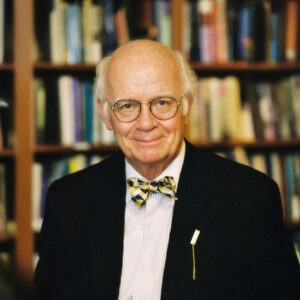Martin E. Marty, Fairfax M. Cone Distinguished Service Professor Emeritus at the University of Chicago, died on February 25, 2025. He was 97 years old.

Photo courtesy Martin Marty Center for the Public Understanding of Religion, University of Chicago Divinity School
Marty was born in West Point, Nebraska, where he was educated in a two-room schoolhouse. He planned to become a Lutheran pastor, but while a student at Concordia Seminary, he pulled an elaborate prank on his professors involving the creation of a nonexistent theologian, “Franz Bibfeldt.” The seminary, not amused, decided that Marty was too immature to be given a pulpit in the United Kingdom as planned. He was assigned instead to a church in Chicago, where he was required to get a doctorate. Later, with his trademark humor, Marty reflected that he had entered the world of religious studies as “punishment.” After earning his doctorate from the University of Chicago in 1956, he spent seven years as pastor of the Lutheran Church of the Holy Spirit in Elk Grove Village, Illinois, which became the fastest-growing Lutheran church in the United States under his leadership. He joined the faculty of the University of Chicago Divinity School in 1963, where he taught for 35 years until his retirement at age 70.
Marty was one of the most influential interpreters of American religion in the 20th century, the author or co-author of 60 books and more than 5,000 shorter works. His immense productivity was fueled by his joy in learning new things. His books include A Short History of Christianity (1959); Righteous Empire: The Protestant Experience in America (1970), which received a National Book Award in 1972; Pilgrims in Their Own Land: Five Hundred Years of Religion in America (1984); and The One and the Many: America’s Struggle for the Common Good (1997). He also published a three-volume series, Modern American Religion (1986–96). With R. Scott Appleby, he edited the five-volume series The Fundamentalism Project (1991–95), which was funded by the American Academy of Arts and Sciences.
During his distinguished career, Marty was awarded the National Humanities Medal, the Medal of the American Academy of Arts and Sciences, the University of Chicago Alumni Medal, the Distinguished Service Medal of the Association of Theological Schools, the Order of Lincoln, and 80 honorary doctorates. He served as the president of the American Society of Church History, the American Catholic Historical Association, and the American Academy of Religion, which created the Martin E. Marty Award for the Public Understanding of Religion in his honor in 1996. Marty also served as the founding president of the Park Ridge Center for the Study of Health, Faith, and Ethics, where he later became the George B. Caldwell Scholar-in-Residence. He paid tribute to his Lutheran faith through many years of service to St. Olaf College, where he served as regent, board chair, interim president (2000), and senior regent. After his retirement in 1998, the University of Chicago Divinity School named the Martin Marty Center for the Public Understanding of Religion in his honor.
Marty was not only a historian of religion but an active participant in the great religious events of his day. He attended the Second Vatican Council in 1964 as a Protestant observer, and he marched at Selma in 1965 with Martin Luther King Jr. He served on two US presidential commissions, and as an editor of the Christian Century, he wrote a popular column about religious issues. His strong commitment to the principle of religious freedom lay behind his tireless efforts to educate the public about the history of religion.
Marty was a gifted historian and public commentator on religion, but first and foremost, he identified as a teacher. During his years in UChicago’s Swift Hall, he always kept a list of his 115 doctoral advisees in his jacket pocket, literally next to his heart. His students and colleagues remember him as cheerful and immensely curious, with a razor-sharp intelligence. Despite his extraordinary achievements, he wore his brilliance lightly. His warmth, kindness, care for others, and intellectual playfulness will be deeply missed.
Marty’s first wife, Elsa L. Schumacher, died in 1981. He is survived by his second wife Harriet J. Meyer; his four children Joel, John, Peter, and Micah; his two lifetime foster children Fran Garcia Carlson and Jeff Garcia; his stepdaughter Ursula Meyer; and his nine grandchildren and 18 great-grandchildren.
Catherine Brekus
Harvard Divinity School
This work is licensed under a Creative Commons Attribution-NonCommercial-NoDerivatives 4.0 International License. Attribution must provide author name, article title, Perspectives on History, date of publication, and a link to this page. This license applies only to the article, not to text or images used here by permission.
